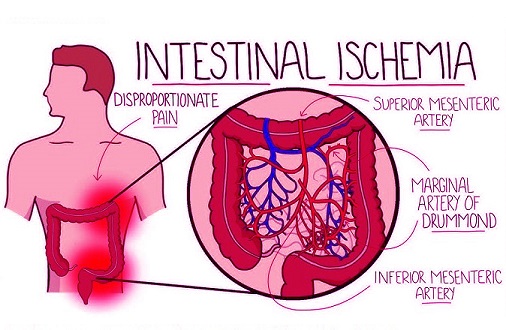Nikhil Prasad Fact checked by:Thailand Medical News Team Oct 29, 2024 1 year, 2 months, 2 days, 6 hours, 7 minutes ago
Medical News: Researchers from the Second Affiliated Hospital of Xi’an Jiaotong University, Xi’an Central Hospital, Ankang Central Hospital, and the Staff Hospital of Changqing Oilfield in China have conducted an illuminating study on how COVID-19 might be associated with acute ischemic colitis - a condition where the blood supply to the colon is reduced, leading to inflammation and damage. Their findings shed light on the frequency, symptoms, and possible mechanisms of ischemic colitis in COVID-19 patients.
 COVID-19’s Surprising Link to Acute Colon Ischemia
Thailand Medical News
COVID-19’s Surprising Link to Acute Colon Ischemia
Thailand Medical News had already previously covered past studies warning about COVID-19’s ability to cause intestinal ischemia and other serious gastrointestinal issues:
https://www.thailandmedical.news/news/many-exposed-to-covid-19-will-develop-acute-ischemic-colitis
https://www.thailandmedical.news/news/breaking-covid-19-news-case-study-shows-that-even-asymptomatic-sars-cov-2-infections-can-lead-to-spontaneous-bowel-perforations
https://www.thailandmedical.news/news/japanese-researchers-warn-that-covid-19-infections-can-cause-gastrointestinal-disorders-that-can-lead-to-deaths
https://www.thailandmedical.news/news/covid-19-news-south-korean-doctors-warn-that-sars-cov-2-can-cause-gastric-ischemia
Study Overview: Connecting COVID-19 to Colon Ischemia
This
Medical News report delves into the association between SARS-CoV-2, the virus causing COVID-19, and ischemic colitis. A prospective study was carried out from December 2022 to January 2023, evaluating cases across multiple hospitals. The research revealed that about one-third of the hospitalized COVID-19 patients who underwent endoscopy showed symptoms resembling ischemic colitis. The study aimed to document the symptoms, treatment approaches, and outcomes for these patients, focusing on their colonoscopy and biopsy findings.
Key Findings: Symptoms and Patient Demographics
The study tracked 12 patients diagnosed with ischemic colitis after COVID-19 infection. The group included three men and nine women, ages 33 to 76, who experienced abdominal pain and bleeding within approximately five days after COVID-19 onset. For these patients, digestive symptoms did not correlate directly with COVID-19 severity, as only two developed pneumonia, while the majority had no respiratory symptoms or oxygenation iss
ues. Half of the patients developed gastrointestinal (GI) symptoms within a day of testing positive for COVID-19, while others showed symptoms within two weeks.
Location and Symptoms
The descending colon was particularly vulnerable, with 83% of patients displaying signs of ischemia in this area. Colonoscopy findings were consistent, revealing diffuse redness, swelling, bleeding, erosion, and ulceration - closely resembling ischemic colitis. Patients exhibited classic ischemic colitis symptoms, including abdominal pain and hematochezia (rectal bleeding). Although severe, these symptoms were temporary and did not progress to chronic conditions.
Insights from Colonoscopy and Biopsy Findings
The researchers conducted detailed colonoscopies to identify patterns and assess the condition of affected regions. The most common findings were severe inflammation, swelling, ulceration, and bleeding in the affected intestinal mucosa. In a unique twist, two patients underwent multiple colonoscopies over two months, providing insight into how these lesions resolved over time without lingering complications. Their biopsies showed evidence of ischemia, with crypt atrophy, reduced crypt formation, and interstitial bleeding. These findings pointed to temporary but significant damage to the mucosal lining of the intestine.
Potential Mechanisms of Colon Ischemia in COVID-19
Researchers suggest multiple possible mechanisms linking SARS-CoV-2 to colon ischemia. Firstly, the virus is known to enter cells through the ACE2 receptor, which is abundantly present in the gastrointestinal tract. This receptor entry may trigger an immune reaction, resulting in a “cytokine storm” - an intense inflammatory response that disrupts the gut’s mucosal lining. Bacterial translocation, or the movement of bacteria across compromised intestinal barriers, can exacerbate this inflammation, leading to the ischemic patterns observed.
Interestingly, the pattern of ischemia in these cases was segmental rather than continuous, which implies that additional factors beyond inflammation alone might be involved. The study suggests that SARS-CoV-2 may induce a hypercoagulable state, causing blood clotting and, subsequently, ischemia in the bowel. However, the study found that patients did not experience significant changes in D-dimer levels (a marker for blood clotting), and abdominal vascular ultrasounds showed no clotting events, suggesting that localized hypercoagulation might be unlikely.
Treatment and Outcomes
None of the patients in this study required anticoagulation or antiviral treatment, and their ischemic symptoms resolved within a few weeks. Supportive care, including fluid infusion and probiotics, likely helped prevent progression. At the 12-month follow-up, all patients reported that they were free of symptoms, indicating that the condition was transient and self-limiting. This finding is especially notable as it suggests that, while ischemic colitis in COVID-19 patients can be severe, it does not necessarily lead to chronic gastrointestinal issues.
Discussion: The Need for Further Research
The study's results contribute to an evolving understanding of COVID-19’s impact on gastrointestinal health. Although ischemic colitis appears to be rare, it could be a critical complication in a subset of patients. The research team highlighted the need for further studies to understand the exact mechanisms by which SARS-CoV-2 affects the vascular and immune systems in the gastrointestinal tract. Larger studies may help identify specific patient risk factors, explore the role of clotting disorders, and develop guidelines for early intervention in similar cases.
Conclusion
The findings of this study reveal that SARS-CoV-2 infection can trigger acute, self-limiting ischemic colitis, usually manifesting within two weeks after infection. Patients displayed severe symptoms such as abdominal pain and hematochezia, which resolved within weeks without long-term complications. The descending colon was most affected, and endoscopic examinations identified classic ischemic colitis signs, including mucosal inflammation, swelling, and ulceration. While the exact mechanisms remain unclear, this study points to a probable link between COVID-19 and temporary colon ischemia that could be managed effectively through supportive care.
The study findings were published in the peer-reviewed Journal of Inflammation Research.
https://www.dovepress.com/association-between-sars-cov-2-infection-and-acute-ischemic-colitis-peer-reviewed-fulltext-article-JIR
For the latest COVID-19 News, keep logging on to Thailand
Medical News.
Read Also:
https://www.thailandmedical.news/news/covid-19-causes-a-variety-of-long-term-digestive-complications
https://www.thailandmedical.news/news/covid-19-news-greek-study-warns-that-sars-cov-2-infections-can-lead-to-development-of-irritable-bowel-syndrome-in-post-covid-phase
